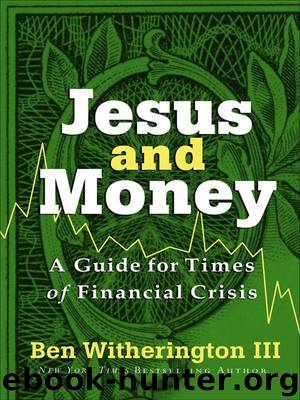Jesus and Money: A Guide for Times of Financial Crisis by Ben Witherington

Author:Ben Witherington [Witherington, Ben]
Language: eng
Format: epub
Tags: Stewardship & Giving, Christian Life, General, Religion, Biblical Studies, Christian
ISBN: 9781441207821
Publisher: Baker Books
Published: 2010-01-01T00:00:00+00:00
Wealth and Poverty in Acts
There has been a tendency in scholarly work on Acts to conclude that Luke has gilded the lily a bit, meaning that he presents more of an ideal rather than a real portrait of early church life, of his hero Paul, of the inevitable triumph of the gospel, and so on. The problem with this analysis is that Luke repeatedly admits that there are serious problems in early Christianity, throughout the period he covers (roughly AD 30–62). That said, it is difficult to discern which things Luke is telling us are normal or characteristic of early Christianity and which things are a rule or standard that Christians should aspire to, particularly in matters of practice. But if one of the criteria for seeing something as normative from Luke’s perspective is finding a repeated pattern, then it will serve us well to look closely at what is said in Acts 2 and 4 about the characteristics of the Jerusalem household meetings. Here property, wealth, and sharing things in common figure prominently in the text.
In Acts 2:42–47 the disciples are said to devote themselves to four things: the teaching of the apostles; koinōnia, or sharing in common; the breaking of bread; and prayer. The text goes on to suggest (vv. 43–47) that the disciples do not in any full or decisive way separate themselves from their Jewish context and heritage. For our purposes verse 44 is most crucial. We are told that this earliest cadre of disciples shares all things in common. Verse 45 more fully explains this by adding that they sold their possessions and real estate, then distributed the proceeds to any who had need within the community. The verb here is in the imperfect tense, indicating that this was not a one-time activity but rather an ongoing one. In other words, we are not to see this activity as simply reflecting an initial burst of enthusiasm after the first Easter. It is a recurring practice that continues whenever the need arises.9
It needs to be noted that here Luke is not talking about some sort of mandatory confiscation and redistribution of goods and property, with everything then parceled out equally to every member of the community. This becomes very clear from a close reading of the Ananias and Sapphira story, in which Peter reminds them that even after they liquidated their assets it was still their choice as to how and to what degree they would dispose of the proceeds or give them away. The point here is that no one was claiming any exclusive right to property, and there were concerted efforts to make sure that no Christian was in want. Christians take care of their own. They do not, for example, rely on the charitable acts of the temple apparatus or a synagogue, or some general dole for the poor in Jerusalem. They take matters into their own hands. Thus what we see here is the family of faith concept put into practice.10
Acts 4:32–37
Download
This site does not store any files on its server. We only index and link to content provided by other sites. Please contact the content providers to delete copyright contents if any and email us, we'll remove relevant links or contents immediately.
The Five People You Meet in Heaven by Mitch Albom(3562)
The Secret Power of Speaking God's Word by Joyce Meyer(3184)
Real Sex by Lauren F. Winner(3016)
Name Book, The: Over 10,000 Names--Their Meanings, Origins, and Spiritual Significance by Astoria Dorothy(2982)
The Holy Spirit by Billy Graham(2944)
0041152001443424520 .pdf by Unknown(2843)
How The Mind Works by Steven Pinker(2813)
ESV Study Bible by Crossway(2774)
Ancient Worlds by Michael Scott(2682)
Churchill by Paul Johnson(2578)
The Meaning of the Library by unknow(2565)
The ESV Study Bible by Crossway Bibles(2550)
The Gnostic Gospels by Pagels Elaine(2527)
MOSES THE EGYPTIAN by Jan Assmann(2412)
Jesus by Paul Johnson(2352)
City of Stairs by Robert Jackson Bennett(2348)
The Complete Dead Sea Scrolls in English (7th Edition) (Penguin Classics) by Geza Vermes(2277)
The Nativity by Geza Vermes(2227)
Ancient Near Eastern Thought and the Old Testament by John H. Walton(2223)
